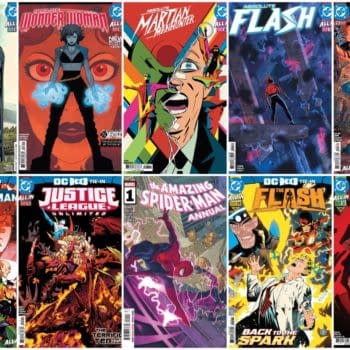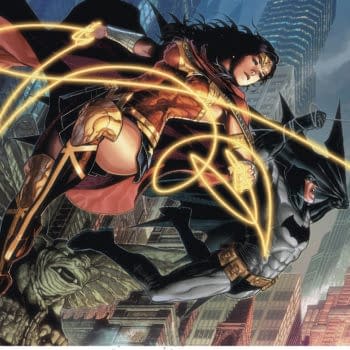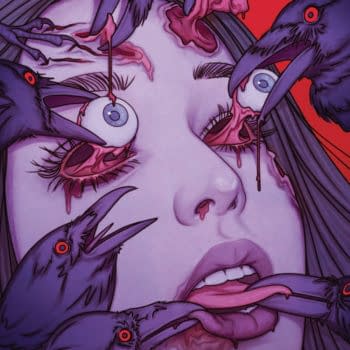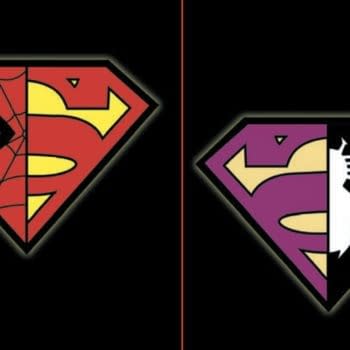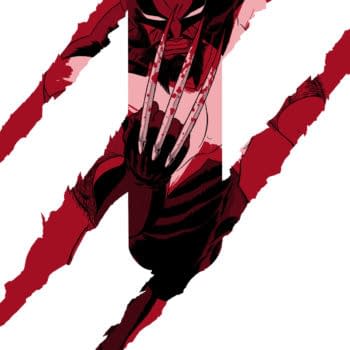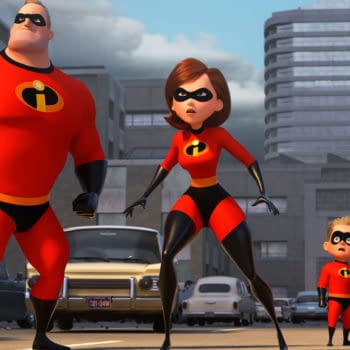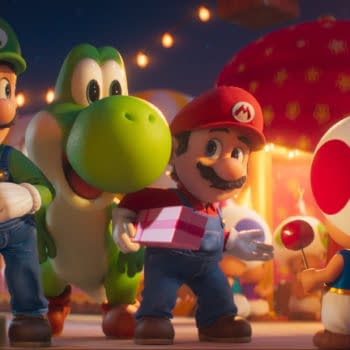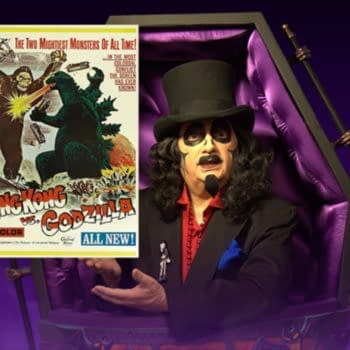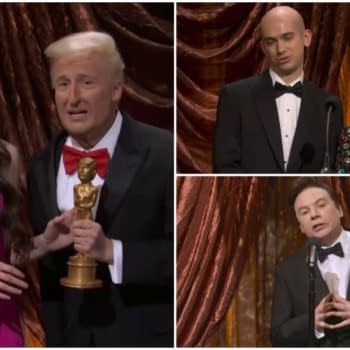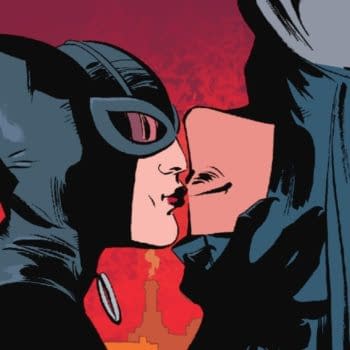Posted in: Movies, TV | Tagged: bbc, doctoir who, kieron gillen, matt smith, peter capaldi, the time of the doctor
Ten Thoughts About The Time Of The Doctor – It's A Wonderful Thirteen Lives (UPDATE)
Welcome to the final Ten Thoughts of Matt Smith's run as Doctor Who. We'll try not to spoil, or if we do only minor ones. But be safe, wait until you've seen it, then think along in the comments below.
We know this is the final episode of Matt Smith. We know he regenerates. We know he will be played by Peter Capaldi. We know this is impossible. Onwards.
1. Is It A Turkey?
Not a chance. This is how the Doctor goes out. If he can help Clara get her turkey cooked in time. Literally, in time. And a bit especially designed to throw the Americans, the existence of the Christmas Cracker. One that rather sums up the show itself.
2. The Doctor's Android Boyfriend?
Apparently he invented one once. Okay, one of the major themes of this episode is revisiting the show, specifically Matt Smith's run, so of course that means the hysterically-criticised "gay agenda". So, yes, the Doctor has been a boyfriend and has had a boyfriend, even if he had to invent one. As in, from scratch.
3. The Naked Doctor
He has liked to get his clothes off given the opportunity, and he gets the opportunity again. To be naked in the TARDIS, to be naked in Clara's home, to be naked in Church. It's a brave decision, as we know from the opening scene, he can't keep his Dalek stalk up. Other blasts from the past include the Doctor's solution to saving Rose from the Daleks, nuns, a certain dietary treat from The Eleventh Hour and even a plug for the iPlayer, the BBC's streaming service that has often been dominated by Doctor Who and brought it a much bigger audience in recent years.
4. The Church Is Going To Get You
Ah yes, the Church. And the nun in charge. And it was from this point that we started to get a consolidated timeline for the Matt Smith run. Because this is the Church that has an army. That creates the Silence (in what was also my biggest laugh of the show for what the creatures we know as the Silence were originally intended for). There are Daleks, there are Dalek-humanoids, there are Weeping Angels, Sontarans and Cybermen. Even a mention of Terileptils. Sadly we missed the Kitchensinkoids.
5. Tying Everything Up With A Bow Tie And Then Letting It Fall To The Floor
But everything else happens here. The ultimate question, "Doctor Who", is asked of everyone. The fall on Trenzalore. What was going on with The Silence, who exploded the TARDIS, the role in creating Melody Pond/River Song, the crack in space and time, everything is getting picked up and answered, by bit, by bit. Some by major plot point, some by throwaway line. Moffat's made a list, he checked it twice. It's the time of the Doctor. And it's striking twelve.
6. It's A Wonderful Thirteen Lives
It's been said that the Doctor has been unnaturally obsessed with the Earth, spending many of his years on one planet, Well, that's basically nothing as to his obsession with Trenszalore in comparison. And in doing so, in a town called Christmas, we get a Christmas small town film, a place where no one can lie (except once… make sure you spot it, who does it and consider how) and it's a perfectly preserved community. Preserved by a maddening church and a Doctor protector, keeping everyone safe from, well, everything, and keeping this town… preserved. Nothing changes, nothing evolves, nothing gets better, it's basically placed in amber. A bit like what has happened to Gallifrey. And with the stakes so high, this cannot be sustained.
7. Weaponising Regeneration
Okay, we know that the Doctor regenerates. We know that he shouldn't be able to, this is his 13th body. And we find out not only how he turns the tables with a thoroughly thought through deus ex machina, gets his mojo back but more importantly weaponises it all. We've seen the damage it can do to a TARDIS. Now you can see the damage it can do to everything else.
8. Hang On, Was That A Power Of Love Ending?
It kind of was, wasn't it? Just a bit? Maybe not quite as much as when Russell T Davies did it, but that was an appeal of love, more than justice, fairness or even mercy. It's not just the public who loves the Doctor…
And the town of Christmas loves him too, all the children of Trenzalore, as they grow through the centuries. And he tells them stories and they draw them for him. Hasn't he been doing that to us all along?
9. The Cameo
Yes there's a cameo. People will concentrate on the big one but there's also a re-creation of one as well who I thought was just as important. But we're not going to spoil the big one here.
10. Bow Ties Are No Longer Cool
And, as we said in the last one of these, he's Scottish. The third Scottish actor to play the role, the first to be allowed to keep the accent.
Roll on 2014!
[UPDATE: from the American side of things (HMS here). And the mythological side of things. Here are a few more thoughts, but they are more SPOILERY than the previous 10! Watch out!]
10a. What to Wear? What to Wear?
It's generally known that in many cultures there's a connection between facing death and leaving behind your clothing. It's very, very old as a concept, but has some more modern reflexes. The Anglo-Saxons, when they were being converted to Christianity embraced the new faith by giving up their elaborate grave goods (including a whole ship in the case of Sutton Hoo) and opting to be buried without coffin, nude, wrapped in a linen shroud with a single fastening pin. They wanted to meet their creator face to face with nothing in the way.
But to get really ancient, one of the best known examples of this is the Sumerian myth of Inana and her journey into the underworld to attend some funeral rites. At each gate of the underworld, she is obliged to leave a possession behind until finally her clothes are taken also. There she is judged, found wanting, and killed, but is later revived at the intervention of other gods. In fact, she instructed her servant to intervene with the gods on her behalf if anything went wrong on her journey. That last bit may sound familiar if you've seen the Christmas special vis a vis Clara and the Crack.
So though the Time of the Doctor opens in a buoyant and amusing manner with the Doctor's nudity, it's a big whopping foreshadowing of his death. And we might associate nudity with rebirth too, as in "birthday suit".
10b. Your Goose (er..Turkey) Is Cooked, Or Not
I just want to add to Rich's observations that the Doctor points out that Clara's turkey MIGHT be cooked if he puts it in the Tardis, or it might "start laying eggs". It's one or the other folks. Could it be both? Death or rebirth? It really is an odd configuration of "Which came first, the chicken or the egg?"
10c. Alas Poor Yorick! I Knew Him, Horatio
If this seems really obvious, apologies. I can't believe it took me until Trenzalore to notice that the Cyberman head "Handles" really does play the part of Yorick's skull in Shakespeare's Hamlet. It's a rumination on life and death, and the Doctor's determination to keep the damaged Handles "alive" reads as a pretty good parallel for him trying to "hold on" (oof, sorry for the pun on Handles) to his last life as it peters out. It's a remnant of former days and former battles, and even his enemies become a subject for nostalgia in that context. And when Handles is no more, the Doctor's final face-off must begin. The Hamlet comparison works for the whole special, though, since the Doctor is all along considering his own death, knowing he has no more regenerations, even if he hasn't admitted it to anyone.
10d. For Whom The Bell Tolls
Yes, of course the bell and bell tower feature prominently in the Time of the Doctor, and there's no mistaking that. But what does the bell mean, and what about the other funerary aspects of the episode? For John Donne (the author of the titular sermon), the bell literally tolls to bring people to a funeral mass. And that's appropriate here, and even appropriate for Trenzalore, facing destruction. But there are other little elements to consider. The Doctor, containing himself within the town of Christmas encounters a fishbowl affect of being celebrated by generation after generation in a close-knit, mythologized way. There are puppet shows about him, cascades of drawings of him. How much more celebration does he need? There's no question that he's been elevated to a kind of deity. And heroes who become deities don't stay in the mortal world forever. It's called apotheosis when they change over and ascend.
Usually you need an appropriate altar or tomb for that, and what better tomb than the bell tower chamber, covered in drawings the way Egyptian tombs are covered in tale-telling hieroglyphs? And then there's his throne, where Clara finds him. But let's add Clara's behavior, kneeling in front of the crack and praying for aid. She's stating the Doctor's obituary and epitaph. It's a plea to change the future, to make it less ordinary. Ordinary life results in death and she needs another outcome. She needs transcendent intervention. And as Rich commented, that "weaponized" transformation is outstandingly visible and striking, much more an apotheosis visually than previous regenerations have been.
If it seems like I'm talking about death an awful lot, it's because this special was so conscious of its own death traditions that it's hard to ignore the trappings. The Doctor sees his 11th (or 12th) life flash before his eyes, literally, and to some extent, his Matt Smith incarnation is dying to join his previous companion (who now died in the past), Amy Pond. For those of you who always thought Amy and the Doctor should have gotten together and Rory confused things, apparently that's all sorted out on the other side. They seem happy enough, at least.
10e. The Baby Jesus is Awfully Grown Up
Well, yes, of course, it's Christmas and the Doctor is dying and regenerating around a town called Christmas where you can only tell the truth and everything is preserved just so for as long as possible. Where he plays Father Christmas mending toys and rewarding the good children by protecting them. But in the bleak midwinter, the old year dies and the new one begins. So, the Doctor is our baby Jesus. Perhaps. And he seems to be, almost, when Clara sees him as the young Matt Smith Doctor again. She's overjoyed. Youth has won and returned. But then it hasn't.
The Doctor regenerating as Peter Capaldi's Doctor, as we knew would happen, is still a little bit of a shock. Why does it work that he's an older Doctor following the events of Trenzalore? Because it was a special contingency to bring him back, because he was already older than this before his reincarnation, because he's played a deity longer than usual for the town of Christmas. But still, it's a strange Baby Jesus. But I think we may want to wait on judging that. Firstly, the whole point of the Jesus born in a manger thing is that it was contrary to expectation and unremarkable looking. That is essentially what we have here. Capaldi's final lines also suggest he's going to play bewildered youth rather well and the contrast may be very entertaining.
So I do agree with Rich, Roll on 2014!




















